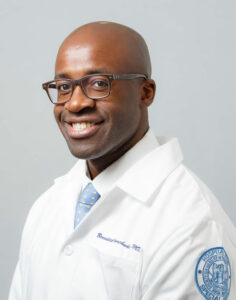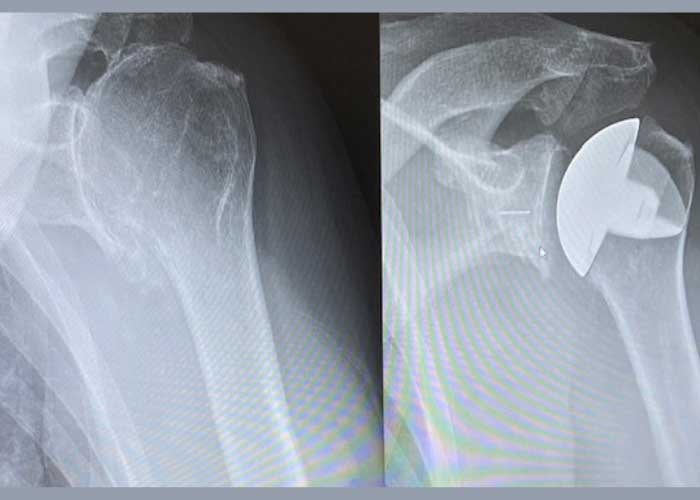Shoulder Replacement Surgeon

Are you suffering from shoulder arthritis? If so, you may be a candidate for a shoulder replacement. Shoulder replacement surgery is a viable option for patients suffering from arthritis who have exhausted all non-surgical and more minimally invasive surgical options. Shoulder replacement surgeon, Doctor Benedict Nwachukwu provides diagnosis as well as surgical and nonsurgical treatment options for patients in Manhattan, New York City, NY who have developed shoulder arthritis. Contact Dr. Nwachukwu’s team today!
What is a shoulder replacement?
A shoulder replacement, also known as a total shoulder arthroplasty, is a well-established and successful procedure for treating severe pain and stiffness in the shoulder that is caused by end-stage arthritis or degenerative joint disease. The primary goal of shoulder replacement surgery is to relieve pain. The secondary goal is to restore motion, function, strength and normal daily activities. Dr. Benedict Nwachukwu, orthopedic shoulder surgeon, offers this treatment to patients in Manhattan, New York City and the surrounding New York boroughs who have exhausted all other treatment options.

Who should have a total shoulder replacement?
The shoulder joint is lined with cartilage which allows for a smooth, pain free range of motion while protecting the bones from rubbing against each other. When the cartilage begins to wear away arthritis can begin. Years of wear and tear to the shoulder joint can cause bone-on-bone wearing within the joint and can advance to become a form of arthritis called osteoarthritis. Also called degenerative joint disease, osteoarthritis can cause symptoms of persistent shoulder pain, swelling and limited range of motion. Individuals with bone-on-bone osteoarthritis also suffer from symptoms of shoulder crepitus. Crepitus is a catching sensation that is felt inside the shoulder when the damaged surfaces of the joint rub or catch on one another. Patients suffering from advanced shoulder arthritis or osteoarthritis that have tried conservative shoulder treatments without relief may be candidates for anatomic shoulder replacement surgery.
When should I have a shoulder arthroplasty?
The decision to have a total shoulder replacement should be carefully considered. Dr. Nwachukwu would recommend an arthroplasty only if other therapies such as corticosteroid injections, NSAD’s, physical therapy, activity modification or if previous arthroscopic surgery has failed to alleviate pain. Reasons to consider a total shoulder replacement include:
- Shoulder pain that prevents a good night’s sleep
- Loss of motion and shoulder stiffness that make it difficult to move the shoulder
- Shoulder pain that interferes with daily activities such as driving, dressing or reaching above the shoulder
- Moderate to severe pain while resting
How is total shoulder replacement surgery done?
Shoulder replacement surgery is performed through a small incision in the front of the shoulder, that gives Dr. Nwachukwu access to the joint. The damaged humeral head (top of the arm bone) is replaced with a metal ball. The glenoid (shoulder socket) receives a new smooth plastic surface that will allow a smooth, comfortable range of motion of the shoulder. The medical-grade plastic used during the resurfacing of the shoulder socket will perform the job the cartilage would have done, if it were still present and functioning properly. The new pieces; the humeral ball and shoulder socket are called a prosthesis. These are kept in place with tight fitting components and medical bone cement. The metal ball on the smooth plastic surface allows for the return of a pain free, smooth motion in the shoulder joint. When performed correctly, total shoulder replacement can return a patient’s shoulder to a functional, comfortable and pain free joint.
How long does a total shoulder replacement last?
Patients in the New York area experience significant pain and functional improvement following an arthroplasty. However, the prosthesis of the metal ball and plastic cup can wear out over time. On an average, the shoulder replacement will last between 10 and 20 years. For this reason, Dr. Nwachukwu prefers to perform shoulder replacement surgery on individuals over the age of 50. Athletes and patients younger than 50 are encouraged by Dr. Nwachukwu to consider minimally invasive joint preservation treatments before undergoing arthroplasty.
How long is the recovery after arthroplasty?
It is important to remember that shoulder replacement surgery is a marathon, not a race. It takes time and commitment to regain the strength and range of motion. Patients who undergo shoulder replacement can expect a significant reduction in pain and good, functional improvement. The following things can be expected following surgery:
- Shoulder replacement surgery is often done with an overnight stay in the hospital.
- The arm is placed in a sling directly following surgery and patients will need to follow Dr. Nwachukwu’s recommendations regarding pain medication and physical therapy exercises.
- Swelling and pain are normal but will decrease over time.
- Ice or a cold compress will help with swelling and pain.
- Stretching exercises, directed by a physical therapist will begin immediately to regain range of motion.
- Nwachukwu may restrict certain motions or shoulder movements for the first 6 weeks, to be determined by the surgery performed.
- Most patients can return to normal daily activities without pain in about 3 to 4 months.
For more information on shoulder replacement, arthroplasty or to see if you are a candidate for this specialized surgical procedure, please contact the office of Benedict Nwachukwu, MD, orthopedic shoulder surgeon serving Manhattan, New York City and surrounding New York boroughs.





